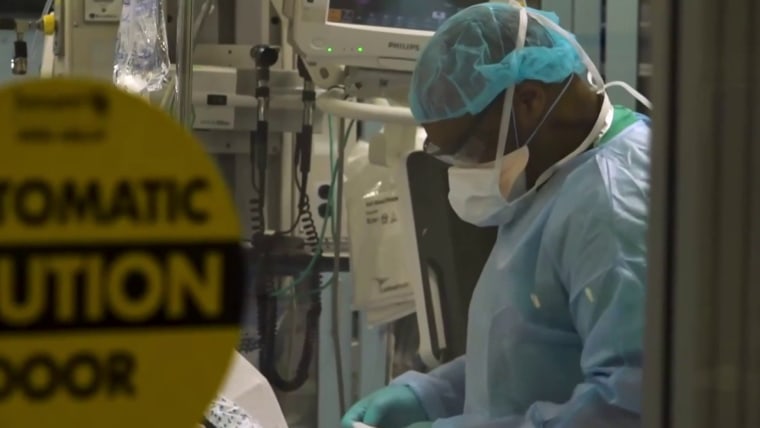There’s no evidence yet to suggest that a Covid-19 vaccine booster shot is needed, a working group for the Centers for Disease Control and Prevention said Wednesday.
That could change as the pandemic evolves, however, and public health officials will continue to monitor the virus to determine if additional shots are warranted in the future.
Full coverage of the coronavirus outbreak
Members of an independent group of advisers to the CDC, called the Advisory Committee on Immunization Practices, agreed with the working group’s conclusion.
There are a number of thorny questions on the topic of boosters, though, including the need to cover unvaccinated people in the U.S. and the rest of world with a first dose before boosting fully vaccinated individuals.
“Prior to going around and giving everyone boosters, we need to improve the overall vaccination rate,” said a member of the committee, Dr. Keipp Talbot, an associate professor of medicine at Vanderbilt University.
Another question posed to the advisory committee is what evidence should be used to decide whether boosters are needed?
A clear indicator would be rising cases in fully vaccinated individuals. But if certain surrogate measures — like waning antibody or T cell levels — could be identified, boosters could potentially be given to prevent a rise in cases.
It’s still unclear what those cutoff levels, called correlates of protection, might be, Dr. Sharon Frey, clinical director of the Center for Vaccine Development at Saint Louis University Medical School, said.
“I think the only thing we can do at this moment is, if we start to see an uptick in reinfection in people, or new infections in people who have been vaccinated, that's our clue that we need to move quickly,” Frey said.
Dr. Jose Romero, the advisory committee's chair, noted that for flu vaccines, public health officials don’t wait until influenza is widespread to vaccinated people — though much is known about the safety of that vaccine.
“We should begin to consider using these boosters before we have evidence of disease from these variants, if this continues to be an ongoing virus with periodic recirculation,” Romero said, referring to the delta variant in particular.
In addition to evidence of waning effectiveness, the safety of an additional dose will be evaluated, as well as the severity of any side effects, Dr. Doran Fink, deputy director of the Food and Drug Administration’s division of vaccines, said during the meeting.
Vaccine boosters
Within weeks of the first Pfizer-BioNTech and Moderna vaccines going into people’s arms in the United States, both companies announced they were starting trials looking at whether a third dose would be needed.
It remains unclear what a third dose would look like; both Pfizer and Moderna are investigating giving a third dose of a vaccine identical to the first two, as well as a third dose that’s been tweaked to better target certain variants of the coronavirus.
Johnson & Johnson has also said it’s studying whether another dose — in its case, a second dose — will be warranted to up protection against the virus.
The National Institute of Allergy and Infectious Disease, or NIAID, is looking into boosters as well, including a clinical trial that studies whether a third shot of a Moderna vaccine could be given after a person initially received two shots of Pfizer, or one shot of Johnson & Johnson.
Results from the Pfizer, Moderna and NIAID studies are expected this summer, Dr. Sara Oliver, a medical epidemiologist with CDC's National Center for Immunization and Respiratory Diseases, said during a presentation to the advisory committee.
Though the current evidence suggests that at this point, a booster isn’t needed, scientists will continue to monitor the data. “A vote to recommend boosters, in any population could, occur whenever data support updated policy,” Oliver said.
Evidence to focus on includes how well the vaccines work in vulnerable populations, such as long-term care residents, older adults and immune-compromised patients, she said.
Download the NBC News app for full coverage of the coronavirus outbreak
A drop in people’s immunity levels — as measured through antibodies or T cells, for example — or a rise in the rate of breakthrough infections could signal that the vaccines’ effectiveness is waning.
Dr. John Beigel, associate director of clinical research for the division of microbiology infectious disease at the National Institute of Allergy and Infectious Disease, told NBC News that researchers there are looking into the correlates of protection. This finding will help researchers in all vaccine trials determine whether a person’s immunity has fallen below necessary levels.
Beigel said he expects those data to be available in the next two months.
Another reason a booster may be warranted is if a new variant emerges that evades the vaccines, said Dr. Dan Barouch, director of the center for virology and vaccine research at Beth Israel Deaconess Medical Center in Boston.
“That hasn’t happened yet,” Barouch said, who worked on developing the Johnson & Johnson vaccine. He is not a member of the advisory committee.
Any trial looking at booster dose study will likely focus on laboratory data as opposed to looking at how protective the vaccine is in the real world, which is what the original vaccine trials did, Barouch said. That means that instead of giving some people a booster and others a placebo and then seeing how many infections occur in the real world, researchers would instead compare the immunity levels in both groups, to see if people who received the booster saw a significant increase.
Follow NBC HEALTH on Twitter & Facebook.
The Link LonkJune 24, 2021 at 04:42AM
https://ift.tt/3xGOo9k
No evidence yet to suggest Covid vaccine booster is needed, CDC group says - NBC News
https://ift.tt/2DVP6sH


No comments:
Post a Comment